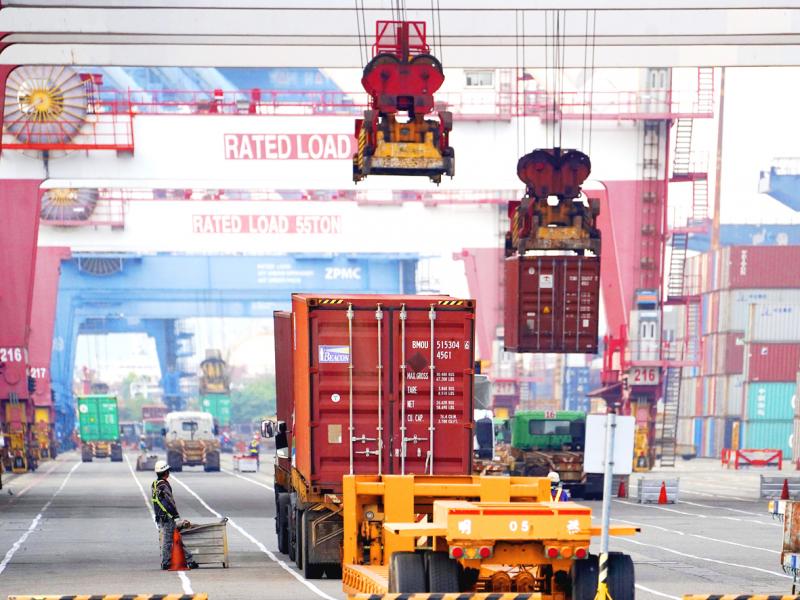The official manufacturing purchasing managers’ index (PMI) last month climbed to 61.2, the fastest advance since March 2017, as all sectors reported an upturn in business on the back of holiday demand and optimism over COVID-19 vaccines, the Chung-Hua Institution for Economic Research (CIER, 中華經濟研究院) said yesterday.
The latest PMI data marked a fifth consecutive month of gains, helped by customers in various parts of the world frontloading orders as the COVID-19 pandemic created shipping difficulties, the Taipei-based think tank said.
“Business in sectors previously hit by the pandemic returned to normal, while growth momentum for electronics suppliers accelerated further,” CIER president Chang Chuang-chang (張傳章) told a news conference in Taipei.

Photo: CNA
PMI figures seek to show the health of the manufacturing industry, with scores above 50 indicating expansion and values below indicating contraction.
Customers were generally upbeat about building inventories after the US presidential election was settled and several drug companies had positive results in their COVID-19 vaccine trials, Chang said.
Some firms, fearing shipping delays after much of Europe and the US introduced partial lockdowns to rein in COVID-19 transmission rates, stockpiled supplies well ahead of the holiday season, Chang said, adding that the annual Singles’ Day shopping blitz also lent support.
The sub-index on new business orders stood at 64.8, dropping 1.1 points from October, while the gauge on industrial production rose 2.8 points to 66.5, the survey showed.
Supply Management Institute in Taiwan (中華採購與供應管理協會) executive director Steve Lai (賴樹鑫) said that the situation is headed toward overheating, or when PMI scores are more than 60 points.
CIER researcher Chen Shin-hui (陳馨蕙) said that concerns over shipping delays contributed to the boom, after shipping companies reconfigured routes to deal with the pandemic.
After the recovery arrived faster than expected, local companies had to vie for containers to deliver their products, Chen said.
The reading on delivery times added 4.1 points from October to 63.5, the survey showed.
The measure on raw material prices gained 6.9 points to 72.5, while the sub-index on unfinished orders added 2.9 points to 59.6, it showed.
Companies hold optimistic outlooks, with the six-month business outlook rising 5.1 points to 63.4, CIER said.
The non-manufacturing index rose 0.4 points to 53.8 — its sixth consecutive month of expansion — although restaurants and hotels continued to struggle, it said.
The situation is likely to improve, as all service-oriented sectors expect business to expand over the next six months, it added.

In Italy’s storied gold-making hubs, jewelers are reworking their designs to trim gold content as they race to blunt the effect of record prices and appeal to shoppers watching their budgets. Gold prices hit a record high on Thursday, surging near US$5,600 an ounce, more than double a year ago as geopolitical concerns and jitters over trade pushed investors toward the safe-haven asset. The rally is putting undue pressure on small artisans as they face mounting demands from customers, including international brands, to produce cheaper items, from signature pieces to wedding rings, according to interviews with four independent jewelers in Italy’s main

Japanese Prime Minister Sanae Takaichi has talked up the benefits of a weaker yen in a campaign speech, adopting a tone at odds with her finance ministry, which has refused to rule out any options to counter excessive foreign exchange volatility. Takaichi later softened her stance, saying she did not have a preference for the yen’s direction. “People say the weak yen is bad right now, but for export industries, it’s a major opportunity,” Takaichi said on Saturday at a rally for Liberal Democratic Party candidate Daishiro Yamagiwa in Kanagawa Prefecture ahead of a snap election on Sunday. “Whether it’s selling food or

CONCERNS: Tech companies investing in AI businesses that purchase their products have raised questions among investors that they are artificially propping up demand Nvidia Corp chief executive officer Jensen Huang (黃仁勳) on Saturday said that the company would be participating in OpenAI’s latest funding round, describing it as potentially “the largest investment we’ve ever made.” “We will invest a great deal of money,” Huang told reporters while visiting Taipei. “I believe in OpenAI. The work that they do is incredible. They’re one of the most consequential companies of our time.” Huang did not say exactly how much Nvidia might contribute, but described the investment as “huge.” “Let Sam announce how much he’s going to raise — it’s for him to decide,” Huang said, referring to OpenAI

The global server market is expected to grow 12.8 percent annually this year, with artificial intelligence (AI) servers projected to account for 16.5 percent, driven by continued investment in AI infrastructure by major cloud service providers (CSPs), market researcher TrendForce Corp (集邦科技) said yesterday. Global AI server shipments this year are expected to increase 28 percent year-on-year to more than 2.7 million units, driven by sustained demand from CSPs and government sovereign cloud projects, TrendForce analyst Frank Kung (龔明德) told the Taipei Times. Demand for GPU-based AI servers, including Nvidia Corp’s GB and Vera Rubin rack systems, is expected to remain high,